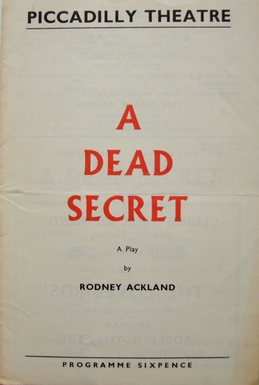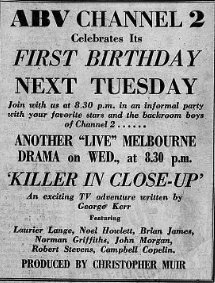Related Research Articles

Agro's Cartoon Connection was an Australian children's television show that aired on the Seven Network from 1990 to 1997. Shown on weekday mornings, it was primarily hosted by Agro, a puppet played by comedian Jamie Dunn. It was originally filmed at BTQ7 from 1990 to 1996, after which it moved to ATN7 in 1997.
The Story of Peter Grey was an Australian television daytime soap opera produced by the Seven Network and first broadcast in July 1962. James Condon starred in the title role as a church minister.
Hunter was an Australian espionage adventure television series screened by the Nine Network from Tuesday 4 July 1967 to March 1969. The series was created by Ian Jones and produced by Crawford Productions.
I Have Been Here Before is a play by J. B. Priestley, first produced by Lewis Casson at the Royalty Theatre, London, on 22 September 1937.
"Episode 523" is the 523rd episode of the Australian soap opera Neighbours. It premiered on Network Ten on 1 July 1987. The episode was written by Ray Harding, directed by Rod Hardy, and executively produced by the serial's creator Reg Watson. Episode 523 focuses on the wedding of popular couple Scott Robinson and Charlene Mitchell. The storyline was devised by the producers after some viewers became outraged by the idea of an unwed couple moving in together. They also believed that the wedding would be "the perfect climax" to the character's long-running relationship and an instant ratings hit.

The Purple Jacaranda was an Australian television mini-series which aired on ABC in 1964 based on a novel by Nancy Graham. Cast included James Condon, Margo Lee, Ronald Morse, Diana Perryman, Walter Sullivan and John Unicomb.

A Dead Secret is a 1957 crime play by Rodney Ackland. It is a murder drama set in 1911 London and is based on the Seddon murder trial. It premiered at the Royal Court Theatre, Liverpool then transferred to the Piccadilly Theatre in London's West End where it ran for 212 performances. The West End cast included Paul Scofield, Madge Brindley, Dinsdale Landen, Megs Jenkins, Harold Scott, Gretchen Franklin, Arthur Lowe, Maureen Delany and Laidman Browne.

Killer in Close-Up was a blanket title covering four live television drama plays produced by the Australian Broadcasting Commission in 1957 and 1958. It could be seen as the first anthology series produced for Australian television.
Corruption in the Palace of Justice is a 1964 Australian television film produced by Oscar Whitbread. Based on an Italian stage play by Ugo Betti, it was a drama aired in a 60-minute time-slot and aired on the non-commercial broadcaster the Australian Broadcasting Commission. The cast included Michael Duffield, Carl Bleazby and Terry Norris. It was produced in Melbourne. It was adapted by Robert Rietti. A copy of the script is at the NAA.
The Sponge Room is an Australian television film which aired in 1964 on ABC. Produced in Melbourne, it aired in a 50-minute time-slot and was an adaptation of an overseas stage play, written by Willis Hall and Keith Waterhouse.

The Sergeant from Burralee is an Australian television play written by Phillip Grenville Mann. The play was also broadcast by the BBC and screened for West German television.

"The Recruiting Officer" is a 1965 Australian television production based on the famous play The Recruiting Officer, which was the first play ever performed in Australia. "The Recruiting Officer" aired on 6 January 1965 in Sydney, 13 January 1965 in Brisbane, and on 20 January 1965 in Melbourne.
"A Season in Hell" is a 1964 Australian TV movie broadcast on the ABC which originally aired as an episode of Wednesday Theatre. It was directed by Henri Safran from a script by Patricia Hooker and was shot at the ABC's Gore Hill Studios in Sydney. "A Season in Hell" aired on 1 April 1964 in Sydney, on 22 April 1964 in Brisbane, and on 29 April 1964 in Melbourne.
"Wall to Wall" is the sixth television play episode of the first season of the Australian anthology television series Australian Playhouse. "Wall to Wall" was written by Ann Kinloch and directed by Eric Tayler and originally aired on ABC on 23 May 1966 It starred Gwen Plumb and was shot in Sydney.
The Rose and Crown is a 1956 Australian television play.
The End Begins is a 1961 Australian television play shot in ABC's Melbourne studios. Like many early Australian TV plays it was based on an overseas script. It was a rare Australian TV play with a science fiction theme and a black lead actor, although no recordings are thought to have survived.
Love and War is a 1967 Australian TV series.
Fly By Night is a 1962 Australian TV play broadcast on the ABC and filmed in London. Written expressly for television, it starred Sophie Stewart who was also in The Little Woman.
Split Level is a 1964 Australian TV play directed by Ken Hannam and written by Noel Robinson. It aired on 7 October 1964 and was shot in Sydney at ABC's Gore Hill Studios.
Alice in Wonderland is a 1962 Australian television film based on Lewis Carroll's 1865 novel Alice's Adventures in Wonderland. It was a pantomime and aired as part of the BP Super Show.
References
- ↑ "TV Guide". Sydney Morning Herald. 25 May 1964. p. 15.
- ↑ ""Bertrand" on Channel 2". Sydney Morning Herald. 28 May 1964. p. 5.
- ↑ "The Sydney Morning Herald 18 May 1964, page Page 23". Sydney Morning Herald. 18 May 1964. p. 23.
- ↑ "TV Guide". The Age. 6 August 1964. p. 35.
- 1 2 "Cat Star, 17, Likes Caviar". TV Times. 26 August 1964. p. 14.
- ↑ "TELEVISION AND RADIO TODAY". The Canberra Times . Australian Capital Territory, Australia. 27 May 1964. p. 33. Retrieved 25 January 2020– via Trove.
- ↑ ""Betrand" on Channel 2". Sydney Morning Herald. 28 March 1964. p. 9.